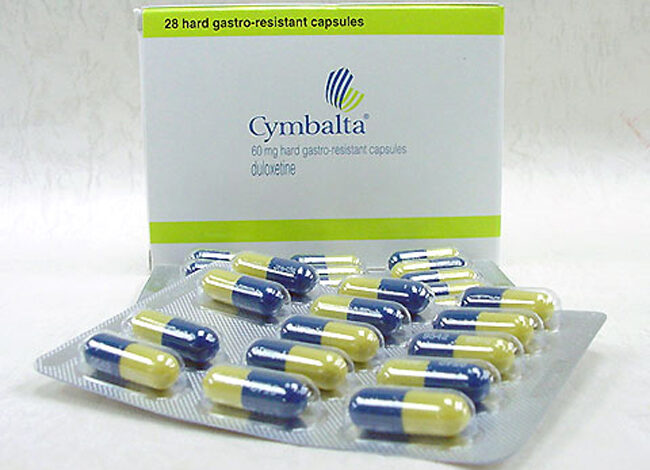Cymbalta: Uses, Side Effects, Withdrawal Symptoms

What is Cymbalta and what does it treat?
Cymbalta is a brand of duloxetine, an antidepressant medication that works in the brain. It is approved for the treatment of major depressive disorder (MDD), generalized anxiety disorder (GAD), diabetic peripheral neuropathic pain (DPNP), fibromyalgia, and chronic musculoskeletal pain.
Symptoms of depression include:
- Depressed mood – feeling sad, empty, or tearful
- Feeling worthless, guilty, hopeless, and helpless
- Loss of interest or pleasure in your usual activities
- Sleep and eat more or less than usual (for most people it is less)
- Low energy, trouble concentrating, or thoughts of death (suicidal thinking)
- Psychomotor agitation (‘nervous energy’)
- Psychomotor retardation (feeling like you are moving and thinking in slow motion)
- Suicidal thoughts or behaviors
Generalized Anxiety Disorder (GAD) occurs when a person experiences excessive anxiety or worry for at least six months. Other symptoms include:
- Restlessness
- Fatigue (low energy, feeling tired all the time)
- Difficulty concentrating
- Irritability
- Muscle tension
- Sleep disturbance (difficulty falling asleep or waking up in the middle of the night)
what is the most important information I should know about Cymbalta?
Do not stop taking Cymbalta, even when you feel better. With input from you, your health care provider will assess how long you will need to take the medicine.
Missing doses of Cymbalta may increase your risk for relapse in your symptoms.
Stopping Cymbalta abruptly may result in one or more of the following withdrawal symptoms: irritability, nausea, feeling dizzy, vomiting, nightmares, headache, and/or paresthesias (prickling, tingling sensation on the skin).
Depression is also a part of bipolar illness. People with bipolar disorder who take antidepressants may be at risk for “switching” from depression into mania. Symptoms of mania include “high” or irritable mood, very high self-esteem, decreased need for sleep, pressure to keep talking, racing thoughts, being easily distracted, frequently involved in activities with a large risk for bad consequences (for example, excessive buying sprees).
Medical attention should be sought if serotonin syndrome is suspected. Please refer to serious side effects for signs/symptoms.
Who is likely to experience symptoms of Cymbalta withdrawal?
It is common for patients who use medications like Cymbalta and duloxetine to experience withdrawal symptoms when they stop using the drug or reduce their dose. While doctors once believed that withdrawal from SNRIs did not cause severe symptoms, it is now commonly understood that antidepressants can cause severe withdrawal symptoms.
Patients who have been taking Cymbalta for at least four weeks are the most likely to experience withdrawal symptoms associated with the medication, as four weeks is about the amount of time it takes Cymbalta to produce maximum effects. Patients who have been taking Cymbalta for at least four weeks should gradually reduce their dose of the medication under the guidance of a healthcare professional if they choose to stop taking the drug.
What is the timeline for Cymbalta withdrawal?
Most people start to experience Cymbalta withdrawal symptoms within about 2 to 4 days of discontinuing the drug or reducing their dose. Each patient will experience Cymbalta withdrawal differently due to variances in the dose, length of time for treatment, and medical history.
Patients who have been taking Cymbalta for at least four weeks and who want to stop using the medication will need to seek the supervision of a medical professional in order to establish a plan for lowering their dose of the drug over time.
Are there specific concerns about Cymbalta and pregnancy?
If you are planning on becoming pregnant, notify your health care provider to best manage your medications. People living with MDD who wish to become pregnant face important decisions. Untreated MDD has risks to the fetus, as well as the mother. It is important to discuss the risks and benefits of treatment with your doctor and caregivers. For women who take antidepressant medications during weeks 13 through the end of their pregnancy (second and third trimesters), there is a risk that the baby can be born before it is fully developed (before 37 weeks).
Caution is advised with breastfeeding since Cymbalta does pass into breast milk.
What should I discuss with my health care provider before taking Cymbalta?
- Symptoms of your condition that bother you the most
- If you have thoughts of suicide or harming yourself
- Medications you have taken in the past for your condition, whether they were effective or caused any adverse effects
- If you experience side effects from your medications, discuss them with your provider. Some side effects may pass with time, but others may require changes to the medication.
- Any other psychiatric or medical problems you have, including a history of bipolar disorder, kidney or liver disease
- All other medications you are currently taking (including over the counter products, herbal and nutritional supplements) and any medication allergies you have
- Other non-medication treatment you are receiving, such as talk therapy or substance abuse treatment. Your provider can explain how these different treatments work with the medication.
- If you are pregnant, plan to become pregnant, or are breastfeeding
- If you drink alcohol or use drugs
How should I take Cymbalta?
Cymbalta is usually taken 1 or 2 times per day with or without food. Typically, patients begin at a low dose of medicine and the dose is increased slowly over several weeks.
The dose usually ranges from 20 mg to 120 mg. Only your health care provider can determine the correct dose for you.
The capsule should be swallowed whole. It should not be chewed, crushed, or broken.
The delayed release capsule (Cymbalta® or generic Cymbalta) should be swallowed whole. It should not be chewed, crushed, or broken. Drizalma Sprinkle™ delayed release capsules may be opened and sprinkled on applesauce, if needed.
Consider using a calendar, pillbox, alarm clock, or cell phone alert to help you remember to take your medication. You may also ask a family member or a friend to remind you or check in with you to be sure you are taking your medication.
What happens if i miss a dose of Cymbalta?
If you miss a dose of Cymbalta take it as soon as you remember, unless it is closer to the time of your next dose. Discuss this with your health care provider. Do not double your next dose or take more than what is prescribed.
What should i avoid while taking Cymbalta?
Avoid drinking alcohol or using illegal drugs while you are taking antidepressant medications. They may decrease the benefits (e.g., worsen your condition) and increase adverse effects (e.g., sedation) of the medication. Alcohol increases the risk of liver problems with Cymbalta.
What happens if i overdose with Cymbalta?
If an overdose occurs, call your doctor or 911. You may need urgent medical care. You may also contact the poison control center at 1-800-222-1222.
A specific treatment to reverse the effects of Cymbalta does not exist.
What are possible side effects of Cymbalta?
Common side effects
Headache, nausea, diarrhea, dry mouth, decreased appetite, increased sweating, feeling nervous, restless, fatigued, sleepy or having trouble sleeping (insomnia). These will often improve over the first week or two as you continue to take the medication.
Sexual side effects, such as problems with orgasm or ejaculatory delay, and blood pressure increases often do not improve over time.
Rare/serious side effects
There have been rare reports of liver failure (sometimes fatal) with Cymbalta. This risk is increased in those with substantial alcohol use or chronic liver disease.
Orthostatic hypotension, or a drop in blood pressure when standing or getting up from sleeping, has been reported in patients taking Cymbalta. The risk may be greater in patients also taking medications for high blood pressure.
Increased heart rate, irregular menstrual cycle, increased frequency of urination or difficulty urinating, increased liver enzymes, teeth grinding, low sodium (symptoms of low sodium levels may include headache, weakness, difficulty concentrating and remembering), angle closure glaucoma (symptoms of angle closure glaucoma may include eye pain, changes in vision, swelling or redness in or around eye), serotonin syndrome (symptoms may include shivering, diarrhea, confusion, severe muscle tightness, fever, seizures, and death), hypertensive crisis (severely elevated blood pressure), myocardial infarction (heart attack), Stevens-Johnson Syndrome (rash), pancreatitis
SNRI antidepressants, including Cymbalta, may increase the risk of bleeding events. Combined use of aspirin, nonsteroidal anti-inflammatory drugs (e.g., ibuprofen, naproxen), warfarin, and other anti-coagulants may increase this risk. This may include gums that bleed more easily, nose bleed, or gastrointestinal bleeding. Some cases have been life threatening.
Are there any risks for taking Cymbalta for long periods of time?
To date, there are no known problems associated with long term use of Cymbalta. It is a safe and effective medication when used as directed.
What other medications may interact with Cymbalta?
Cymbalta should not be taken with or within 2 weeks of taking monoamine oxidase inhibitors (MAOIs). These include phenelzine (Nardil®), tranylcypromine (Parnate®), isocarboxazid (Marplan®), rasagiline (Azalect®) and selegiline (Emsam®).
Although rare, there is an increased risk of serotonin syndrome when Cymbalta is used with other medications that increase serotonin, such as other antidepressants, migraine medications called “triptans” (e.g., Imitrex®), some pain medications (e.g., tramadol (Ultram®), the antibiotic linezolid (Zyvox®), and amphetamines.
The following medications may increase the levels and effects of Cymbalta: cimetidine (Tagamet®), ciprofloxacin (Cipro®), fluoxetine (Prozac®), fluvoxamine (Luvox®), paroxetine (Paxil®)
Cymbalta may increase the effects of other medications that can cause bleeding (e.g., ibuprofen (Advil®, Motrin®), warfarin (Coumadin®) and aspirin).
How long does it take for cymbalta to Work?
Sleep, energy, or appetite may show some improvement within the first 1-2 weeks. Improvement in these physical symptoms can be an important early signal that the medication is working. Depressed mood and lack of interest in activities may need up to 6-8 weeks to fully improve.
Summary Of FDA Black Box Warnings
Suicidal thoughts or actions in children and adults
Depression and certain other psychiatric disorders are themselves associated with increases in the risk of suicide. Patients with major depressive disorder (MDD), both adult and pediatric, may experience worsening of their depression and/or the emergence of suicidal ideation and behavior (suicidality) or unusual changes in behavior, whether or not they are taking antidepressant medications. This risk may persist until significant remission occurs.
In short-term studies, antidepressants increased the risk of suicidality in children, adolescents, and young adults when compared to placebo. Short-term studies did not show an increase in the risk of suicidality with antidepressants compared to placebo in adults beyond age 24. Adults age 65 and older taking antidepressants have a decreased risk of suicidality. Patients, their families, and caregivers should be alert to the emergence of anxiety, restlessness, irritability, aggressiveness and insomnia. If these symptoms emerge, they should be reported to the patient’s prescriber or health care professional. All patients being treated with antidepressants for any indication should watch for and notify their health care provider for worsening symptoms, suicidality and unusual changes in behavior, especially during the first few months of treatment.





